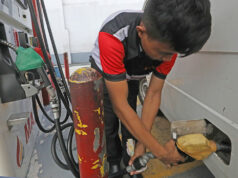February inflation may exceed goal — BSP
Inflation is expected to quicken to as fast as 5.1% in February amid rising fuel and food prices, Philippine central bank Governor Benjamin E. Diokno said on Friday.
The Bangko Sentral ng Pilipinas (BSP) expects the consumer price index at 4.3% to 5.1%, beyond its 2-4% target this year and faster than 4.2% in January.
“Upward price pressure for the month emanate from the continued uptick in global crude oil prices and elevated fish prices,” Mr. Diokno told reporters in a Viber group message.
inflation could breach 4% until the third quarter due to supply pressures and base effects, Mr. Diokno separately told a Manila Times forum on Friday.
“Inflation is seen to decelerate below the midpoint of the target range by Q4 2021 and Q1 2022 due to negative base effects before settling close to the midpoint by the second half of 2022,” he said.
Global oil prices have picked up in recent weeks amid supply disruptions caused by extreme weather in the US and as demand gradually recovers.
At home, gasoline, kerosene and diesel prices have increased by P3.05, P2.90 and P3.30 this month, based on data from the Department of Energy.
Meanwhile, the open fishing season and lifting of the fishing ban in some parts of the country are expected to bring down fish prices especially of household staples such as round scad or galunggong.
Mr. Diokno said lower power rates and the temporary price caps on meat products in Metro Manila, as well as stable rice prices could somehow pull inflation this month.
The government imposed a 60-day price ceiling on some pork and chicken products and boosted pork imports to counter soaring prices caused by an African Swine Fever outbreak. Some vendors have chosen not to sell these products.
Data from the Philippine Statistics Authority showed the average wholesale price of regular milled rice slipped by 0.1% to P33.31, while the retail price was down by 0.03% to P36.14.
Manila Electric Co. this month said electricity bills of typical households might fall by P14 in February.
The central bank kept the overnight reverse repurchase, lending and deposit rates at 2%, 2.5%, and 1.5%, respectively on Feb. 11 after inflation quickened to a two-year high last month. Last year, it slashed rates by 200 basis points.
The Monetary Board will hold its next policy-setting meeting on Mar. 25.



